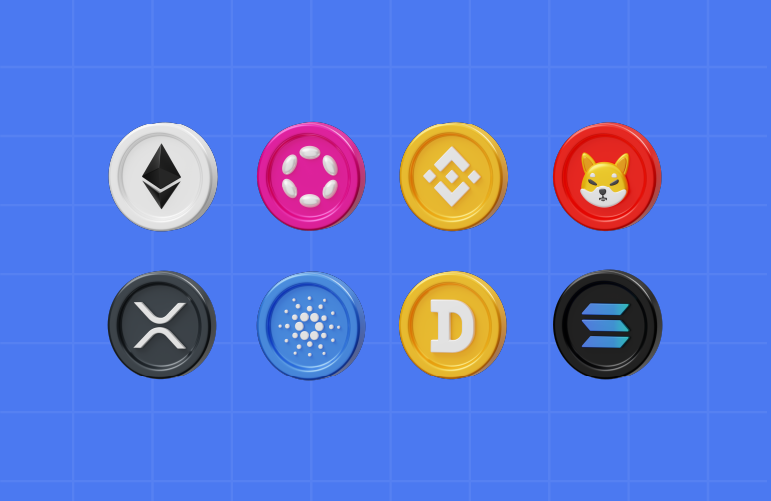After the decentralization of monetary transactions, the financial world has undergone a significant amount of change. The world of cryptocurrency is extremely diverse and consists of various cryptocurrencies known as “altcoins”. To fully grasp what are altcoins, it is important to understand how they expand the crypto ecosystem beyond Bitcoin. We will explore what are altcoins, the differences between Bitcoin and altcoins, the kinds of altcoins, the best altcoins, and their functions, benefits, and limitations in this blog. This may help you decide what altcoins to buy. Also, we will shed light on Pi42’s unique features and how it incorporates altcoins for efficient trading. Pi42 is India’s first Crypto-INR Perpetual Futures Exchange.
What Are Altcoins?
In general, all cryptocurrencies which are not Bitcoin (BTC) are referred to as altcoins. Many users searching for what is an altcoin are essentially trying to understand this distinction. Since most cryptocurrencies originate from one of the two, however, some people consider altcoins to be all cryptocurrencies other than Bitcoin and Ethereum (ETH). To verify transactions, establish new blocks, or establish themselves apart from Bitcoin and Ethereum by offering additional characteristics or functions, some altcoins employ distinct consensus techniques.
Programmers of altcoins typically have various objectives or purposes in mind for the tokens or cryptocurrencies they develop and release. There are tens of thousands of altcoins on the market, often referred to as crypto alt coins across exchanges and trading platforms. Altcoins differ according to function and design. It’s tricky to predict what’s next for altcoins. Their existence depends on whether the blockchain they were designed for continues to be used.
Differences between Bitcoin and Altcoins
Bitcoin set the benchmark and philosophy for decentralized peer-to-peer digital currency. Altcoins distinguish themselves from Bitcoin by addressing limitations in Bitcoin’s design. For example, Ethereum uses smart contracts, which makes it more flexible and efficient than Bitcoin. Stablecoins aim to reduce volatility by pegging their value to fiat currencies, enabling smoother transactions.
For users focused on understanding altcoins, this comparison is crucial, as it highlights how innovation drives adoption and use cases across blockchain ecosystems.
Popular Altcoins List
Ethereum (ETH), Avalanche (AVAX), Dogecoin (DOGE), and Cardano (ADA)
Some of the most notable altcoins include Ethereum (ETH), Avalanche (AVAX), Dogecoin (DOGE), and Cardano (ADA). Each of these altcoins has carved out a niche within the market, offering unique features and functionalities. For instance, Ethereum is widely recognized for its smart contract capabilities, while Cardano emphasizes a peer-reviewed, research-driven approach to blockchain development.
Types of Altcoins
There are various types of altcoins according to their functions and utilities. The following are some of the most common categories:
Stablecoins
Stablecoins are fixed-priced cryptocurrencies based on blockchain technology. Their value is tied to another asset, such as fiat currency or commodities like gold. Stablecoins aim to maintain price stability and reduce volatility. Examples include Tether (USDT) and USD Coin (USDC).
Utility Tokens
Utility tokens operate on smart contract platforms and are used to access specific services within an ecosystem. These tokens are commonly distributed during initial coin offerings (ICOs) and can be used for transaction fees, platform access, or service payments.
Security Tokens
Security tokens represent ownership, investment contracts, or tokenized real-world assets such as real estate or stocks. These tokens are regulated and must comply with securities laws, offering a bridge between traditional finance and blockchain technology.
The Purpose of Altcoins
Altcoins play a vital role in the cryptocurrency ecosystem by offering innovation, specialization, and diversity. For those exploring what are altcoins, understanding their purpose helps clarify why the market extends far beyond Bitcoin.
Innovation and Diversity in Blockchain
Altcoins drive blockchain innovation by enabling decentralized finance (DeFi), privacy-focused transactions, and scalable infrastructure. Projects like Ethereum and Monero exemplify how altcoins expand blockchain functionality.
Unique Features and Use Cases
Altcoins offer faster transactions, lower fees, and specialized solutions. Cardano, for example, focuses on scalability and sustainability, addressing limitations found in earlier blockchains. These innovations showcase how altcoins work to solve specific industry challenges.
Crypto Ecosystem Contributions
Altcoins increase competition and encourage continuous technological improvement. Many features first introduced by altcoins later influence major networks like Bitcoin.
Altcoins – Pros & Cons
Just like any investment, altcoins have both advantages and limitations.
Pros
- Diversification: Investing in altcoins helps spread risk across assets
- Innovation: Many altcoins introduce cutting-edge blockchain solutions
- Accessibility: Lower-priced altcoins can reduce entry barriers
Cons
- Volatility: Prices can fluctuate significantly
- Regulatory uncertainty: Legal frameworks remain unclear for many projects
- Liquidity risks: Some altcoins may be harder to trade
Pi42 and Altcoins
Pi42 provides a modern trading platform for Crypto-INR perpetual futures contracts that includes altcoins. Its intuitive interface, high liquidity, and low transaction costs support efficient trading. The platform also supports advanced altcoin trading features, enabling users to hedge, diversify, and speculate with precision.
Altcoins are a foundational part of the cryptocurrency ecosystem, offering diversity, innovation, and specialized use cases beyond Bitcoin. Understanding what are altcoins helps investors make informed decisions while navigating opportunities and risks. With platforms like Pi42 offering reliable infrastructure, traders can engage with altcoins more confidently and efficiently.
Expand Your Knowledge
Crypto Derivatives Explained: Beginner-Friendly Guide
Crypto Futures Trading for Beginners: A Simple Guide
What is Crypto Algorithmic Trading? Understanding Algo Trading in the Crypto Market

